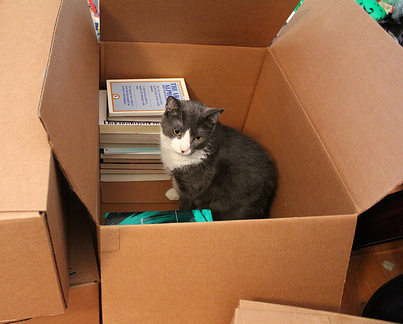On August 17th I walked away from the closing table with a single key in my hand that had “41” written in marker on the keychain. This item would let me into my new home, my FIRST home ever. And with that realization, I began to panic.
I spend the majority of my career working with students on their Executive Functioning as it relates to academic success. I often share with students the ways in which I’d managed my own executive functioning in school, too. But the experience of becoming a homeowner was akin to the universe saying, “If you think you’re good at executive functioning, here’s your ultimate test.” The task of moving from my loft apartment into a house challenged me across multiple executive function domains, including emotional regulation, planning, prioritizing and goal-directed persistence.

The first thing that occurred to me was that, according to my rental agreement, I had less than a month to pack up my apartment and get into my home. In addition, that timeline was butting up against the beginning of the school year. These thoughts threw me into emotional dysregulation: How on earth could I work full time, plan for the start of school and simultaneously pack up a relatively large accumulation of stuff? And then into smaller-scale concerns: What would I do if my hot water heater broke? What if my neighbors had noisy dogs that they left outside all day? If someone were having a “what if” contest, I’d have swept the competition.
I knew that getting my emotions in check was the most critical task as they were paralyzing me from moving forward with the process. To do so, I ended up focusing on executive functioning categories to relieve my anxieties.
The first thing I did was plan. Using my Google calendar, I worked backwards from the last day of my lease to determine which days should be spent packing, which days should be spent hauling loads over to my new home, and which days would be spent unpacking. I labeled big blocks of time in my calendar with P, H, and U respectively. “Ok,” I reasoned with myself, “there’s technically sufficient time to get everything done before my move-out date.” I also created a quick problem/solution chart for my what-if emergencies so that, should the hot water heater actually break, I wouldn’t need to think; instead, I’d just follow the directions on my chart (“call Randy”).
Sure, my plan looked nice with blocks of time neatly sectioned off, color-coordinated and labeled, but initiating that plan was harder than I anticipated. I’d muse about the process in what felt like a never-ending loop of inquiries: “What should I pack first? Wait, I can’t pack anything until I get boxes. Where do I even get boxes?” (At the time, my trusty free box supplier -a supermarket that I shop at- was a in dispute with their CEO, and I was participating in the boycott). It became clear that planning was not enough; I’d need to prioritize tasks for each day of the plan, too.
Prioritizing meant asking myself questions about use: which items do I need more immediately once I’m in my new house, such as my toothbrush, bed sheets, and work clothes? Which items can stay in boxes for a month - or more - if necessary? As I packed, I labeled my boxes with a numerical system according to how frequently I’d use something. Boxes with a #1 contained daily items: unpack immediately. Boxes with a #10? Well, those might end up on the street during the first round of trash collection. Who even knows what’s in those boxes (they’re still unopened, if you’re wondering)?
Since I was not hiring movers for this experience (something I mindfully reflected about afterwards), I had to tap into my goal-directed persistence skills tremendously. What's one thing I know about persistence? It’s tough to muster it up alone. Since I, personally, benefit from having a support system, I solicited both friends and family to aid in the move at different stages. For each big day of packing or hauling, we’d set a reward at the end to keep us motivated: Brick-oven pizza at the restaurant down the street or a fun trip to a department store to get something decorative for the living room. Since the biggest goal of them all - getting out of my apartment on time -- seemed so far away, having mini-goals throughout was more effective than only having one main goal. Having mini-goals helped me curb the inclination to say, “Oh, I’ll get to that stuff next weekend.” This was key because, eventually, there’d be no more “next weekends” to rely on.
I should admit here that things weren’t totally smooth and organized throughout this process. For one thing, I didn’t realize it would take nearly a week to get the internet/cable set up, meaning I spent that week library-hopping or huddled in a cafe or restaurant with free Wi-Fi to get internet access. In addition, I didn’t tell the Post Office that I was moving ahead of time, so I had to make multiple trips back to my old apartment to retrieve my mail before the new renters would get it.
If I had to identify the biggest lesson I learned from moving, it would be this: when we manage our daily tasks, we spend a small amount of our mental energy mindfully using strategies that help us to be successful. But, when we face tasks that disrupt our routines or are more challenging than what we’re used to, that’s when our Executive Functioning really gets tested. The skills and strategies that I introduce to my students have immediate benefits -- getting through an exam, completing an essay, planning out a project -- but will have long-term benefits for when they face challenges outside of academics that demand those key skills of emotional regulation, planning, prioritizing and persisting.
photo credit: quinn.anya via photopin cc
